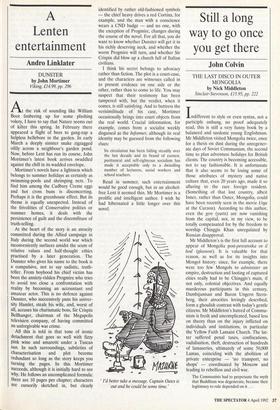A Lenten entertainment
Andro Linklater
DUNSTER
by John Mortimer Viking, £14.99, pp. 296 At the risk of sounding like William Boot limbering up for some plashing volery, I have to say that Nature seems out of kilter this spring. In February there appeared a flight of bees to gang-zap a helpless hellebore in the garden. In early March a deeply sinister snake zigzagged oilily across a neighbour's garden pond. Now, before Lent has run its course, John Mortimer's latest book arrives swaddled against the chill in its wadded envelope.
Mortimer's novels have a lightness which belongs to summer holidays as certainly as swimming-pools and shrimping nets. To find him among the Cadbury Creme eggs and hot cross buns is disconcerting. Perhaps it is the greenhouse effect. But its theme is equally unexpected. Instead of the frivolities of Conservative politics or summer homes, it deals with the persistence of guilt and the discomfiture of truth-telling.
At the heart of the story is an atrocity committed during the Allied campaign in Italy during the second world war which inconveniently surfaces amidst the scum of relative values and half-thought ethics practised by a later generation. The Dunster who gives his name to the book is a compulsive, not to say sadistic, truth- teller. From boyhood his chief victim has been the anxiety-ridden Progmire who tries to avoid too close a confrontation with reality by becoming an accountant and amateur actor. This is no defence against Dunster, who successively pans his univer- sity Hamlet, steals his wife, and, worst of all, accuses his charismatic boss, Sir Crispin Bellhanger, chairman of the Megapolis television company, of having committed an unforgivable war crime.
All this is told in that tone of ironic detachment that goes so well with fizzy pink wine and amaretti under a Tuscan sun. In such surroundings, subtleties of characterisation and plot become redundant so long as the story keeps you turning the pages. In this Mortimer succeeds, although it is initially hard to see why. He follows an uncomplicated formula: there are 10 pages per chapter; characters are cursorily sketched in, but clearly
identified by rather old-fashioned symbols — the chief heavy drives a red Cortina, for example, and the man with a conscience wears a CND badge — and no one, with the exception of Progmire, changes during the course of the novel. For all that, you do want to know whether Dunster will get it in his richly deserving neck, and whether the worm Progmire will turn, and whether Sir Crispin did blow up a church full of Italian civilians.
I think his secret belongs to advocacy rather than fiction. The plot is a court-case, and the characters are witnesses called in to present evidence on one side or the other, rather than to come to life. You may suspect that their testimony has been tampered with, but the verdict, when it comes, is still satisfying. And to buttress the verisimilitude of his case, Mortimer occasionally brings into court objects from the real world. Crucial information, for example, comes from a socialist weekly disguised as the Informer, although its real identity may be guessed from the following clues:
Its circulation has been falling steadily over the last decade and its brand of earnest, puritanical and self-righteous socialism has made it acceptable only to a dwindling number of lecturers, social workers and school teachers.
Read in summer, such entertainment would be good enough, but in an alcohol- free Lent it seemed thin. Mr Mortimer is a prolific and intelligent author. I wish he had hibernated a little longer over this novel.
' I'd better take a message. Captain Oates is out and he could be some time.'


























































 Previous page
Previous page